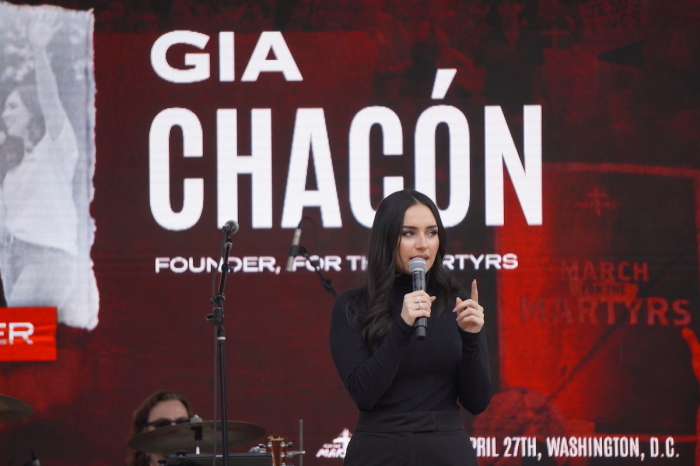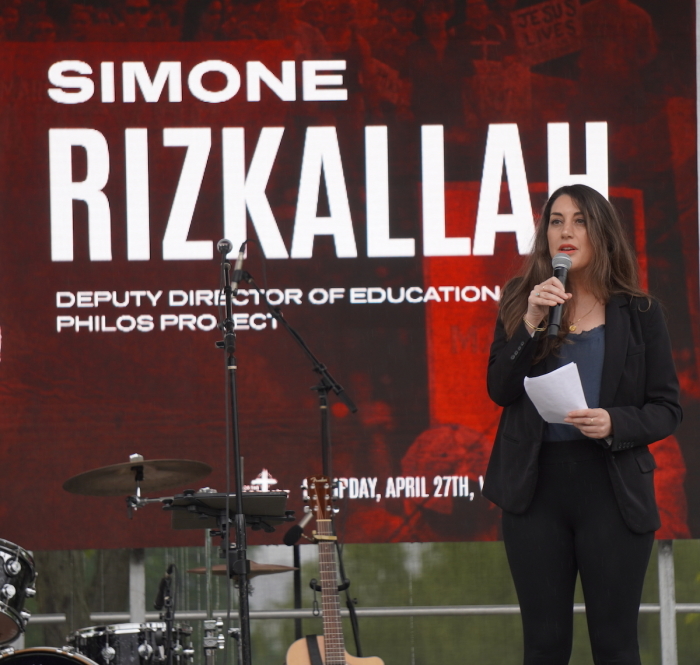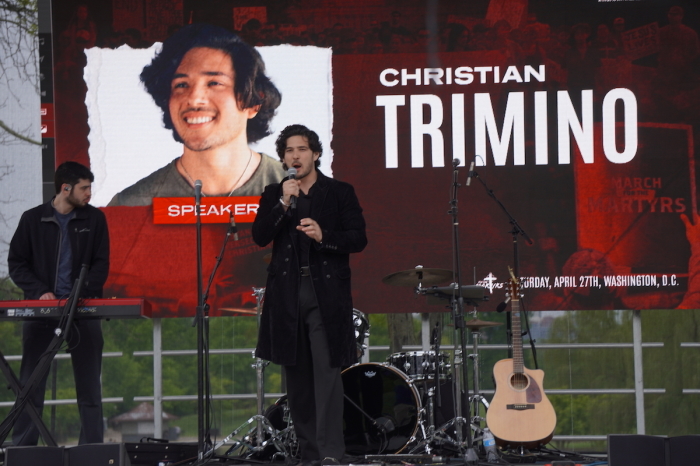March for the Martyrs urges American Christians to 'follow Jesus no matter the cost'

WASHINGTON — Religious freedom activists are encouraging Americans to learn from Christians who live in countries where they face persecution or death for their faith and develop a willingness to “follow Jesus no matter the cost.”
The fourth annual March for the Martyrs was held in the nation’s capital on Saturday. The event, which drew dozens of people to the National Mall, seeks to raise awareness of the plight of persecuted Christians worldwide. Following a rally featuring worship music and speeches from religious freedom activists, participants marched through the streets to the Museum of the Bible.
“What we’re really excited about is how many Christians from all denominations come together,” For the Martyrs founder Gia Chacón said in an interview with The Christian Post shortly before the event kicked off. “This is not just an event for Evangelicals or Baptists; this is an event for everyone who professes Jesus Christ as Lord, and that’s what we’re most excited about.”
“Christian persecution is a human rights issue, so not only are we coming together in prayer as the Body of Christ, but we hope to bring this … crisis to the forefront of the fight for human rights and demand action from the United States government in protecting Christians all over the world,” she added. “The spiritual component of the March for the Martyrs should not be underestimated. It is so powerful when Christians come together as one voice in prayer and to uplift human dignity and advocate for human rights.”
Chacón said March for the Martyrs is one way to advocate for “religious freedom and the protection of our brothers and sisters who are suffering for their faith in Christ.” During remarks delivered on stage, she elaborated on the hostile atmosphere Christians face in other parts of the world: “In places throughout the Middle East, Christians are suffering every day for their faith. Laying down their life is something that’s normal, not a rare occurrence.”
“Christian persecution has increased by 100 million people” since the first March for the Martyrs took place in 2020, Chacón lamented. “There are now over 365 million Christians around the world who are facing persecution because of their faith in Christ.”
During her speech, Chacón recalled a conversation she had with Egyptian Christians who lost loved ones as a result of Christian persecution: “They said, ‘We’re so proud of them, we’re so proud of them that Jesus meant everything to them.’”
“We need that witness here in the United States,” Chacón asserted. “We need the courage to lay down our life, to follow Jesus no matter the cost.”

Other speakers at the event echoed Chacón’s call for the American Christians to embrace a stronger Christian witness. Simone Rizkallah, the director of education for the Philos Project, quoted a response from an Eastern Catholic religious leader to a Westerner who asked, “what can we do to help” Christians in Iraq, Syria and other countries who found themselves under attack by the Islamic State terrorist group. The patriarch replied, “be happy.”
“What he meant by saying ‘be happy’ is to so much embody the glory of God, to so much embody and reflect and witness to Christian joy that our sacrifices in the East don’t feel like they’re sacrificed in vain when it comes to the Body of Christ,” Rizkallah said, suggesting throughout her remarks that Christians in the U.S. lack that kind of zeal.
Rizkallah agreed with the conclusion reached by Mother Teresa that “the poorest country” was the U.S. “because of the poverty of loneliness.” The religious freedom activist suggested that the loneliness noticed by the late spiritual leader stems from the fact that “the United States has forgotten God, it has forgotten Jesus, it has forgotten its roots.”
As the granddaughter of Armenians who escaped to Egypt amid the Armenian Genocide, Rizkallah said her parents came to the United States before she was born. While she expressed gratitude for “the economic prosperity and the religious freedom that this country provides,” she lamented that “something spiritually was lost when we became Americans.”
Rizkallah said she was disgusted by the fact that her classmates at the Catholic high school she attended “didn’t care about the faith.”
“I thought to myself, isn’t it interesting that you’re finally free to practice your faith and when you’re finally free, you don’t care anymore,” she added.

Another speaker, Christian speaker and media personality Christian Trimino, elaborated on how visiting the dictatorship of Cuba in 2016 changed his perspective on life: “You have these people who have so much joy. You have beautiful architecture, classic cars, amazing food and despite what their living conditions were, when you talk to these people, they’re all so full of joy and they’re all so happy.”
“When you look at Western culture, we live in a world right now where we’re contrasting the United States with a lot of these other countries and one word that comes to mind is ‘comfortability,’” he contended. Trimino contrasted what he viewed as the prevailing mindset in the U.S., where people don't “want to do anything that’s against their immediate comfort” with the philosophy of Christians in Cuba and other hotbeds of religious persecution.
“You have people who are literally being killed just for saying that they believe in Jesus. You have people that are being forced out of their homes. You have people that are being forced out of their countries. You have people who are being tortured, being separated from families all because they don’t want to … go against Jesus.”
Trimino suggested that Americans can learn a lesson from “our brothers and sisters who are persecuted around the world” who have “such a real relationship with Jesus.” He detailed how these people have adopted a philosophy that “you can take my home, you can take my business, you can take my reputation, you can take my money, you can take my wife, you can take my husband, you can take my kids, I’ll even give you my life, but the one thing that you cannot take from me is my Jesus.”
He further insisted that Americans have an obligation to “take the freedom that we have in the United States and to be grateful for it and to steward it well, to use our freedom to come to events like this, to start organizations like Gia started, and to actually make positive change and to stand for and to fight and to say, ‘Thank you, Jesus, that we have the opportunity that you have placed us in this time and in this place to make global change around the world.’”
Ryan Foley is a reporter for The Christian Post. He can be reached at: [email protected]



























